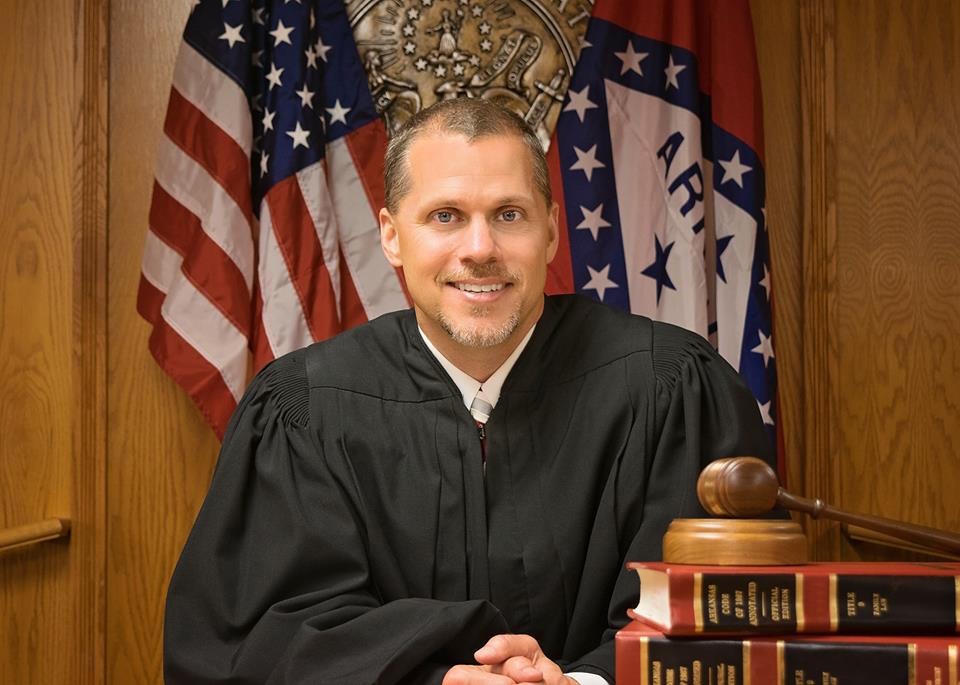Arkansas Supreme Court to decide fate of constitutional limit on lawsuits

The Arkansas Supreme Court could soon decide whether a constitutional amendment limiting damages in lawsuits is invalid. Justice Shawn Womack, pictured here, is a former state legislator who sponsored bills that similarly limited damages. (Photo from Womack's Facebook page.)
An Arkansas court last week struck down a proposed constitutional amendment that would drastically limit damages that juries can award in lawsuits involving serious injuries. The judge ruled that the amendment, which would also limit attorneys' fees and give the legislature the power to make court rules, did not comply with the state constitution's ban on "bundling" several provisions in one amendment.
The case will be appealed to the Arkansas Supreme Court, where elections have become a political battlefield pitting corporate interests supporting tort reform against trial lawyers who represent injured plaintiffs. After the court struck down earlier tort reform laws, corporate-funded groups began spending millions to elect new justices.
The Arkansas court last week said the proposed amendment would violate the right of citizens "to be adequately compensated" for injuries caused by others. The state constitution gives "every person" the right to a legal remedy "for all injuries or wrongs," and the right to "obtain justice freely, … completely, and without denial." But the Arkansas amendment would with few exceptions limit punitive and non-economic damages to $500,000 in cases involving environmental pollution, civil rights violations, and other harms.
If the Arkansas Supreme Court hears the case, at least two justices will have to decide if they have a conflict of interest that requires their recusal. Justice Shawn Womack is a former legislator who supported tort reform measures and sponsored legislation to limit lawsuits. Chief Justice Dan Kemp has spoken out against the provision of the amendment giving the legislature the power to write court rules.
Big money backing amendments
In the 1980s, Big Tobacco and other corporations that faced class action lawsuits over dangerous products launched the tort reform movement. In their book "Distorting the Law," William Haltom and Michael McCann lay out how these corporations engaged in an enormously successful propaganda campaign to convince Americans that they suffered from an epidemic of "frivolous lawsuits."
The Koch brothers, the U.S. Chamber of Commerce, and health care interests joined in the push for limiting lawsuits. States across the country — including almost every state in the South — passed tort reform laws.
In Arkansas, the state Chamber of Commerce has long pushed tort reform, and it joined the lawsuit to defend the proposed amendment. The group has given hundreds of thousands of dollars in campaign contributions to Arkansas candidates, including several justices.
Supporters of the tort reform measure argue it would create jobs, citing the experiences of neighboring states. But Jerry Cox of the conservative Family Council Action Committee, which opposes the amendment because it "puts a price tag on human life," points out that many of the tort reform laws in those states only apply to medical malpractice lawsuits.
Cox said the nursing home industry is driving the push for constitutional limits on lawsuits in Arkansas. The limits on non-economic damages would harm elderly patients who often don't suffer economic damages like lost income. The industry spent big to support an earlier version of the amendment.
As Facing South has reported, Michael Morton, who owns 15 percent of the state's nursing homes, has invested heavily to promote the amendment and to elect sympathetic judges. One of those judges is now in federal prison after pleading guilty to bribery for accepting a campaign contribution in exchange for lowering a $5 million verdict against Morton's company in a wrongful death lawsuit.
Will the votes count?
Proposed constitutional amendments in Arkansas and other states are still facing lawsuits, creating uncertainty just weeks before the election. In a different lawsuit, the Arkansas Chamber wants a state court to strike down a constitutional amendment to raise the state minimum wage to $11 an hour. The chamber and its allies argue that the signatures required to get the amendment on the ballot were invalid. Meanwhile, a proposed amendment to allow casinos in Arkansas is facing two lawsuits.
A similarly chaotic situation has unfolded in North Carolina, where elections officials were delayed from printing ballets due to litigation over constitutional amendments proposed by the state legislature, including one to let legislators choose some judges. And in Florida, the state Supreme Court recently struck from the ballot an amendment that would have expanded charter schools.
The ballots have already been printed in Arkansas, but the judge last week ordered state officials not to count or certify the votes on the amendment. The same thing could happen in North Carolina, where the state Supreme Court allowed the vote on the amendments to go forward while keeping the lawsuit challenging them alive. If they are approved, the high court could revisit the issue.
Should the Arkansas amendment be rejected by voters — and a recent poll suggests it will — the lawsuit challenging it will be moot.
Tags
Billy Corriher
Billy is a contributing writer with Facing South who specializes in judicial selection, voting rights, and the courts in North Carolina.
